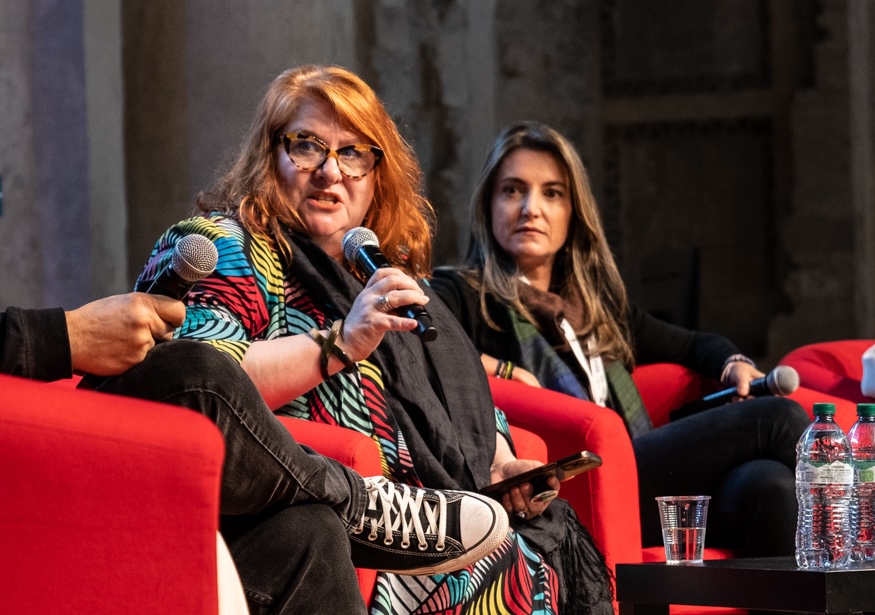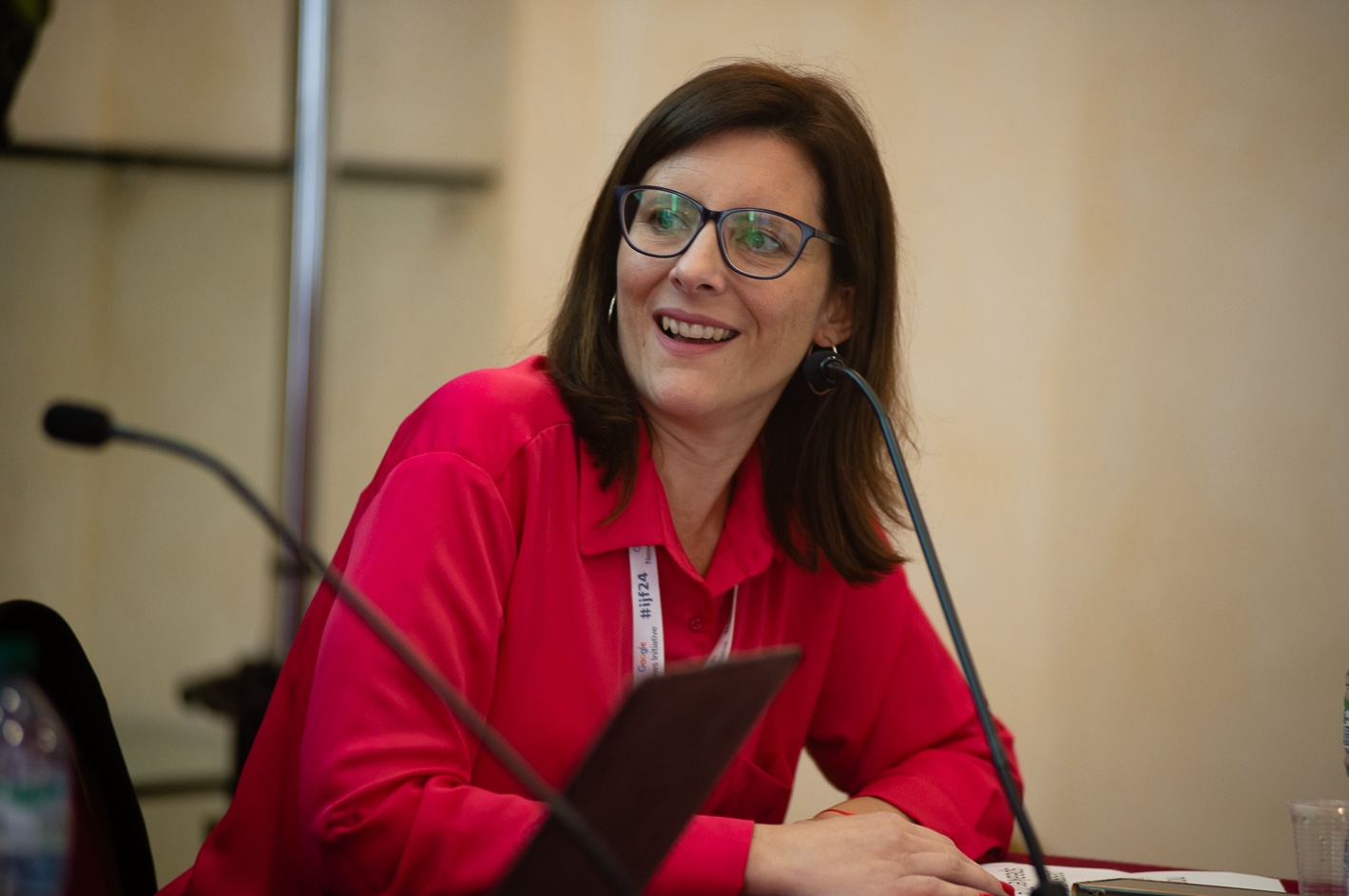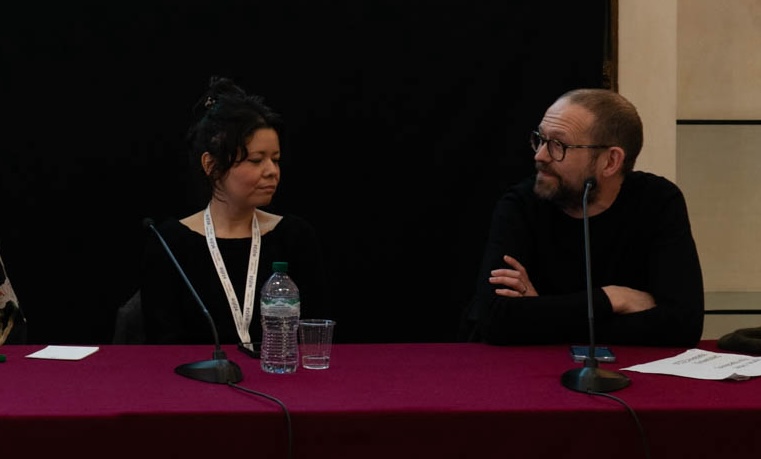Voters in six Latin American countries will elect for new presidents this year, while at least two countries in the region have local elections scheduled.
In the current context of disinformation, polarization and authoritarianism in Latin America, this year represents multiple challenges for the defense of democracy, according to journalists and defenders of press freedom from Argentina, Brazil and Mexico who participated in the 2024 International Journalism Festival, held in Perugia, Italy, from April 17 to 21.
The monitoring of disinformation from news organizations, the risks of using artificial intelligence and social networks in political campaigns and the current role of fact checking in the region were topics that speakers from these countries addressed in different panels during the festival, which had at least 10 Latin American speakers.
Patrícia Campos Mello, reporter-at-large and columnist for Brazilian newspaper Folha de S.Paulo, said that it is very likely that in some of the countries with elections this year there will be cases of denial of electoral results driven by disinformation campaigns.

Patrícia Campos Mello (right) participated in a panel on how editors are responding to information pollution in a crucial year for democracy. (Photo: Monica Rizza - Licensed under CC BY-ND 4.0 DEED)
Campos Mello gave as an example what happened in Brazil on Jan., 8, 2023, when a group of supporters of former President Jair Bolsonaro attacked federal buildings in the capital, Brasilia, in protest of the victory of Luis Inácio Lula da Silva in the 2022 presidential elections. The journalist recalled that the attack was facilitated by social networks and instant messaging platforms.
“What we sort of realized is that this is going to be a permanent campaign from now on in several countries, I mean, saying that the elections are fraudulent. It's just like a preemptive coup and it's going to be used always,” Campos Mello said during the panel “Disarming disinformation: how leading international editors are responding to information pollution in a pivotal year for democracy.”
“That means we have to be permanently monitoring and covering disinformation operations,” she added.
The journalist shared the three fronts that Folha de S.Paulo uses to try to counteract the disinformation generated by these campaigns. The first is to monitor them and try to identify who finances them. The second is to closely monitor the lobbying of technology companies that seek to avoid legislation around digital platforms. And thirdly, monitor the rules of social networks regarding the dissemination of content.
Campos Mello highlighted the concern that, six months before the local elections that will be held in more than 500 cities in Brazil next October, there is still no legislation in that country regarding the use of social networks and messaging platforms.
“The tech companies are aggressively lobbying against any kind of tech regulation. In Brazil they have been very successful, they've managed to block legislation in Congress for several years,” the journalist said. “In place what we have is just random judges or Supreme Court judges deciding to censor this or censor that.”
As an example of the consequences that this lack of legislation has had, Campos Mello mentioned the case of the public confrontation at the beginning of April between Elon Musk, owner of X (formerly Twitter), and the judge of the Supreme Federal Court of Brazil Alexandre de Moraes, who in recent years has ordered the suspension of X profiles accused of spreading electoral disinformation.
“We have judges regulating, which is not ideal, it's not democratic. You want to have legislation discussed in Congress by people elected by the voters,” she said. “What we're seeing is if you don't have regulation, there's no vacuum, something's going to go to that.”
Folha de S.Paulo has an alliance with the Brazilian research and consulting company Quaest, which developed a platform that monitors WhatsApp and Telegram groups, which Campos Mello spoke about during the panel as one of the newspaper's strategies to combat electoral disinformation. This tool permits tracking of issues that are being discussed in certain groups. At the time, the tool even allowed the newspaper's team to identify financing strategies for the movement that tried to ignore the results of the elections in 2023.
“Even though everybody was doing this we were caught by surprise with the attacks in Brasilia in 2023. So that means we're not doing it enough, we have to do it more and we have to investigate further,” Campos Mello said. “Also when there's no regulation it increases our duty to be trying to understand these movements.”
However, the regulation of technological platforms can become a double-edged sword, especially in countries with institutional weakness, according to Luis Fernando García, lawyer and executive director of R3D (Red en Defensa de los Derechos Digitales), from Mexico. He participated in the panel “Social media, AI, and elections: perspectives from the Global South on the ‘Year of Democracy,’” which was moderated by Campos Mello.
García said that journalists must consider other factors involved in the phenomenon of disinformation and threats to the democracy of each country, such as authoritarianism, militarization and the presence of organized crime.
“Disinformation itself is a complex phenomenon, it's not recent, not explained by a single technology, by one state actor, by one company or set of companies. There are no easy fixes,” García said. “With the rise of authoritarians in many places in the world, [regulation of speech online] gives governments the opportunity to exert more control over populations and to dismantle democracy.”

Luis Fernando García dijo que la pérdida de confianza de la gente en los medios también favorece la desinformación. (Foto: César López Linares)
As an example, García mentioned the “Electoral Censorship” project that R3D carried out with organizations Article 19 and Access Now, which investigated the growing tendency of electoral authorities in Mexico to use precautionary measures to request digital platforms to remove content from users, media and journalists.
“We already have evidence that it [the power of electoral authorities] has been abused to suppress speech that is totally legal,” García said. “There are several law proposals pushed by the Army, by the way, to legitimize these influence operations and to legitimize and to create a new cybersecurity agency, for example, that has powers to censor speech to combat disinformation, to do surveillance, and to normalize all this infrastructure.”
García also spoke about the “Army of Bots” investigation, published by R3D this year, which documented the existence of a military operations center that carries out monitoring activities on social media users who make critical posts toward the Mexican Armed Forces or the federal government. The investigation reported that this center also creates fake profiles to obtain more information about users and uses software to operate bot farms to push pro-government narratives and attack journalists and human rights defenders.
“All these disinformation and manipulation techniques are really widespread and normalized among the whole political spectrum,” García said. “We should think about not only challenging and thinking about regulation of, for example, AI in abstract, but also regulation and enforcement that challenges the current wild surveillance business model on top of which disinformation thrives.”
The loss of trust in media is another factor that favors disinformation, García said. The panelist urged journalists to ask themselves why some people currently trust anonymous WhatsApp messages more than what the news media or the government itself say.
Although, he said, the loss of trust is not only the fault of the media, they do play a fundamental role in rebuilding that trust. In this regard, Campos Mello agreed that journalists should not limit themselves to blaming governments or technological platforms for disinformation, but also analyze how they can improve to combat it.
“There's a responsibility that also media have in how trust was lost and also an opportunity of how trust can be regained and think about, ‘how can I make my audiences trust me,’ ‘how can I be more transparent about my finances, about my editorial decisions,’” Garcia said.
Florencia Ballarino, science journalist and senior editor at Chequeado, the Argentine media outlet that specializes in fact checking, spoke at the festival about how misinformation can also distort narratives around climate change during electoral campaigns.
During her participation in the panel “Truth in the age of climate crisis: journalism's crucial role in exposing climate misinformation,” the journalist gave the example of the 2023 electoral process in Argentina, during which Chequeado carried out the project “Unmasking Climate Change Misinformation in Argentina,” with support from the Pulitzer Center. The project aimed to identify the most prevalent false and misleading narratives about climate change during the presidential campaign, and the actors behind them.
Chequeado carried out daily monitoring on social networks in search of possible environmental misinformation. Ballarino said that after analyzing the findings, her team identified three main misinformation narratives that circulated during the presidential campaign. The first was the narrative of denial of climate change and its consequences. The second referred to the denial that human activities were responsible for global warming. And the third was a narrative propagating conspiracy theories about climate change.
“Most misinformation came from organized campaigns, by groups that benefit from denial action of climate change,” Ballarino said. “In our project we found that libertarian and right wing groups were the main sources of misinformation, pushing this false idea that we have to choose between economic growth and protecting the environment.”
Ballarino said that even current President Javier Milei was one of the main promoters of these narratives. In interviews and debates as a candidate, Milei denied the effects of climate change and human responsibility for global warming.

Florencia Ballarino said that libertarian and right wing groups pushed climate change denialist narratives during the most recent elections in Argentina. (Photo: Diego Figone - Licensed under CC BY-ND 4.0 DEED)
As part of the project, Chequeado published a series of articles that refuted these narratives with data and information based on scientific evidence. However, Ballarino said that debunking false or misleading information during election campaigns is not the only thing journalists should do to combat misinformation.
“We know that debunking misinformation is not enough. Our goal is to make audiences more prepared to recognize false narratives and false information,” she said. “It is crucial to identify trends in disinformation and the actor who is spreading it, as it can help prevent misinformation from going viral. Besides, it is also important to identify information gaps, issues that are not easy to find data [for], and fill them with accurate information.”
In addition to promoting media literacy among the public, the journalist said that it is important for journalists to verify their sources and to work with scientific evidence and with the support of scientists.
In a highly polarized society like Brazil today, people want to know who is behind what is published in the media, the intentions of the journalists who sign articles and what the agenda of news organizations is, according to Tai Nalon, co-founder and executive director of the Brazilian fact-checking organization Aos Fatos.
Nalon, who was part of the panel “Transparency: does it actually work to combat mis and disinformation,” said that journalists should be conscious that these questions exist and find some way to respond to them to maintain audience credibility in the face of misinformation.
“That's the main value of having a public, transparent methodology, and a transparent way of showing people why things are false or not that much,” she said. “And another thing that I think that transparency can lead to is people getting to know who you are.”
In a country like Brazil, where there are currently more than 600 judicial proceedings against journalists, according to the Brazilian Association of Investigative Journalism (Abraji), transparency can also be a powerful defense for journalism.
Nalon said Aos Fatos has faced several lawsuits in recent years over its verification work. But the media outlet's transparency policies, which include documenting each source of information and explaining to readers the reason for turning to those sources, have prevented these lawsuits from affecting them, the journalist said.
“We could prove what we were saying. I know it is kind of basic, but sometimes it's not, because many times people don't know how journalism works,” she said. “It's something that we regard as something that is obvious, but when you provide to a judge all the documentation that was used, and the processes you chose to follow in order to publish something, it might be really valuable.”
However, Aos Fatos' “total” transparency policy has also been used against it. Nalón said that her media outlet used to publish a detailed report of annual income and expenses, until the subjects behind some lawsuits against the media outlet began to demand part of that income as a form of reparation.
“We still disclose how we get the money, so basically we don't publish figures anymore,” she said. “We've passed through, for the past six years, a very difficult time in Brazil, in which every information that we would provide could be used against us.”
Nalon said that transparency has also been a fundamental element in the development of FátimaGPT, the Aos Fatos chatbot that in its most recent version incorporated generative artificial intelligence. The tool works with an extensive database that includes all the reports and verifications that the media outlet has carried out in its nine years of existence.

Tai Nalon (left) said that Aos Fatos' work to debunk former President Bolsonaro's statements is an example of the impact that fact-checking is having. (Photo: Claudio Faina - Licensed under CC BY-ND 4.0 DEED)
“We couldn't afford doing that if we didn't have a public methodology, a public disclosure of sources, an errors policy that would control the quality of the [chatbot’s] responses,” she said.
In another of the panels in which she participated, “Fact-checking: dead or alive?”, Nalon spoke of the important role that data verification has played in her country in recent years, especially during the Bolsonaro presidency. The journalist recalled that in the last administration, traditional Brazilian media, such as television networks and newspapers, began to point out the lies of the former president just as the fact checkers did.
Aos Fatos' work to debunk Bolsonaro is an example of the impact that fact checking is having on journalism, not only in Brazil, but around the world, Nalon said. The outlet verified every statement made by the former president during the four years he was in power and found more than 6,000 false or misleading statements.
The project was mentioned in an investigation of Bolsonaro carried out in the Brazilian Congress as evidence that lies were a recurring government practice and that the Bolsonaro administration benefited from a disinformation scheme.
“I don't see an impact more evident than this. This is why fact checking was created, actually,” Nalon said. “If there is a specific group of journalists that are making a difference in some democracies in the world, [they] are fact checkers.”